MercoPress. South Atlantic News Agency
Uruguay
-
Monday, January 11th 2016 - 13:50 UTC
Argentina and Uruguay praise new spirit in relations and “return to normality”.
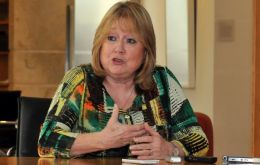
Foreign Minister Susana Malcorra said that the meeting between President Mauricio Macri and his Uruguayan counterpart Tabare Vazquez last Thursday symbolized a “return to normality” for bilateral relations between the two neighbours.
-
Friday, January 8th 2016 - 11:06 UTC
Argentina and Uruguay will bid to jointly host 2030 World Cup
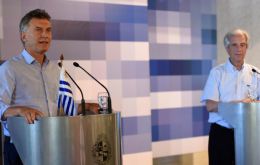
Uruguayan President Tabare Vazquez and Argentine counterpart Mauricio Macri agreed on Thursday that their countries will present a joint bid to host the World Cup in 2030, a century after Uruguay was the site of the first tournament.
-
Friday, January 8th 2016 - 08:06 UTC
Macri and Vazquez marked the beginning of a new chapter in bilateral relations
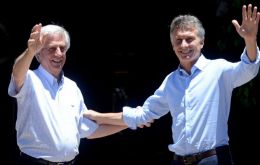
Uruguay and Argentina presidents Tabare Vazquez and Mauricio Macri made on Thursday several announcements referred to bilateral issues indicating relations between the two neighboring countries have effectively improved following years of tension and misunderstandings with the governments of Nestor Kirchner and Cristina Fernandez.
-
Thursday, January 7th 2016 - 09:27 UTC
Uruguay's 2016 Antarctic campaign takes off; ship to deliver 250 tons of fuel and 40 tons of supplies

Uruguayan navy rescue vessel ROU 26 “Vanguardia” left this week from Montevideo for Antarctica loaded with fuel and provisions for the country's scientific base “General Artigas” at King George Island.
-
Thursday, January 7th 2016 - 07:43 UTC
Vazquez receives Macri: “good relations with Argentina, top priority for Uruguay”
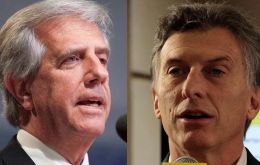
Uruguayan president Tabare Vazquez will host on Thursday his Argentine peer Mauricio Macri to address several controversial issues from the bilateral agenda which are pending from the twelve years of the Kirchner couple. According to Uruguayan sources they include trade, River Plate channels and navigation, ports and pulp mills among other issues.
-
Monday, January 4th 2016 - 07:39 UTC
Chinese jigger heading for South Atlantic catches fire in Montevideo port

A Chinese jigger flying a convenience flag and ready to leave Montevideo for the South Atlantic fully provisioned suffered a serious fire which apparently started in the engine room and rapidly spread to the rest of the vessel.
-
Wednesday, December 30th 2015 - 02:22 UTC
Busy weekend for Ushuaia: 8.000 cruise visitors

Over 8.000 cruise visitors arrived in Ushuaia over the weekend when the Star Princess (2.600 pax), Norwegian Sun (2.400 pax), Infinity (2.400 pax) and the Seabourn Quest coincided in the extreme south port of Argentina in the peak of the Southern hemisphere season.
-
Tuesday, December 29th 2015 - 21:54 UTC
Environmental groups blame massive deforestation for floods in Mercosur members

Deforestation is one of the main causes of the floods in South America that have left at least 160,000 people, 25,000 of them in Argentina alone, homeless, environmental groups said.
-
Monday, December 28th 2015 - 08:50 UTC
Uruguayan officials invited to London to learn about Public-Private-Partnership
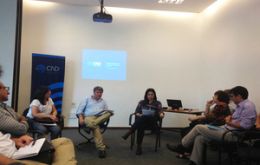
Uruguayan representatives of public entities who travelled to the United Kingdom and Brazil fed back on their experiences on Public-Private Partnership in an event held in the central office of the National Development Corporation (CND) in Montevideo.
-
Saturday, December 12th 2015 - 02:55 UTC
All presidents confirmed attendance of Mercosur summit, including Macri and Maduro
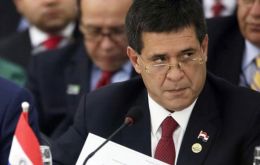
The presidents of Mercosur member-countries have confirmed attendance to the group's summit scheduled for next 21 December and hosted by Paraguay, the country that currently holds the rotating chair, according to diplomatic sources in Asuncion.
